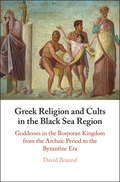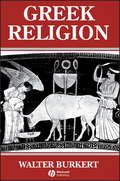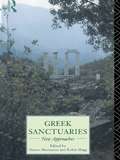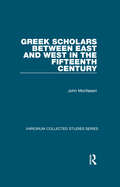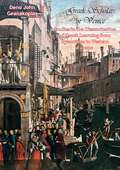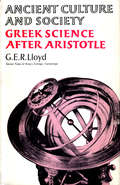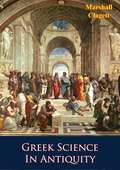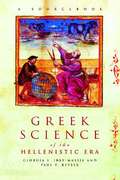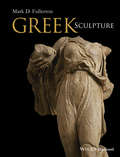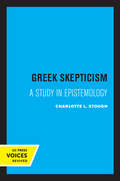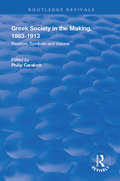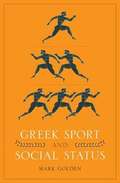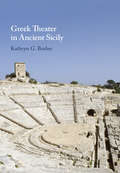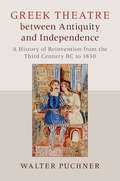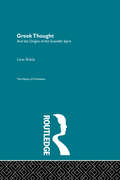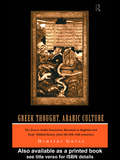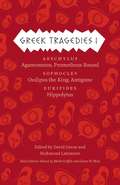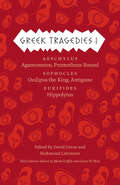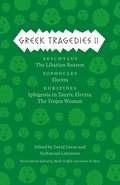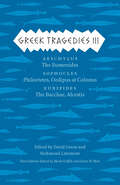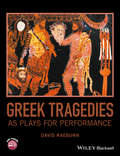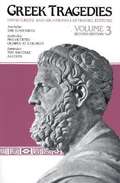- Table View
- List View
Greek Religion and Cults in the Black Sea Region: Goddesses In The Bosporan Kingdom From The Archaic Period To The Byzantine Era
by David BraundThis is the first integrated study of Greek religion and cults of the Black Sea region, centred upon the Bosporan Kingdom of its northern shores, but with connections and consequences for Greece and much of the Mediterranean world. David Braund explains the cohesive function of key goddesses (Aphrodite Ourania, Artemis Ephesia, Taurian Parthenos, Isis) as it develops from archaic colonization through Athenian imperialism, the Hellenistic world and the Roman Empire in the East down to the Byzantine era. There is a wealth of new and unfamiliar data on all these deities, with multiple consequences for other areas and cults, such as Diana at Aricia, Orthia in Sparta, Argos' irrigation from Egypt, Athens' Aphrodite Ourania and Artemis Tauropolos and more. Greek religion is shown as key to the internal workings of the Bosporan Kingdom, its sense of its landscape and origins and its shifting relationships with the rest of its world.
Greek Religion: Archaic and Classical (Ancient World)
by Walter Burkert"Greek Religion . . . already has the standing of a classic, and the publication of an English version, which incorporates new material and is in effect a second edition, demands a toast . . . Anyone who pretends to survey Greek religion must be phenomenally learned. Burkert is. His book is a marvel of professional scholarship." — London Review of Books "This book has established itself as a masterpiece, packed with learning but also rich in ideas and connections of every sort. Its appearance in a good English translation is an event not only for Hellenists but for all those interested in the study of religion . . . nobody else could have produced an account of the subject of comparable range and power. This will be the best history of Greek religion for this generation." — New York Review of Books Cover illustration: detail from an Attic vase, 450 B.C., showing a victory sacrifice (The Mansell Collection).
Greek Sanctuaries: New Approaches
by Nanno Marinatos Robin HäggFirst Published in 2004. Routledge is an imprint of Taylor & Francis, an informa company.
Greek Scholars between East and West in the Fifteenth Century
by John MonfasaniAlthough the immense importance for the Renaissance of Greek émigrés to fifteenth-century Italy has long been recognized, much basic research on the phenomenon remains to be done. This new volume by John Monfasani gathers together fourteen studies filling in some of the gaps in our knowledge. The philosophers George Gemistus Pletho and George Amiroutzes, the great churchman Cardinal Bessarion, and the famous humanists George of Trebizond and Theodore Gaza are the subjects of some of the articles. Other articles treat the émigrés as a group within the wider frame of contemporary issues, such as humanism, the theological debate between the Orthodox and Roman Catholics, and the process of translating Greek texts into Latin. Furthermore, some notable Latin figures also enter into several of the articles in a detailed way, specifically, Nicholas of Cusa, Niccolò Perotti, and Pietro Balbi.
Greek Scholars in Venice
by Deno John GeanakoplosTHE MOVEMENT which more than any other served to widen the intellectual horizon of western Europe during the later Middle Ages and the Renaissance was the restoration of Greek letters. In the history of this revival a significant role was played by the Greek scholar-exiles from the Byzantine, or former Byzantine, areas of the East. Beginning in the late fourteenth century and extending well into the sixteenth, a more or less steadily increasing flow of refugees or voluntary exiles from the Greek East—a veritable diaspora—seeking to escape the Turkish domination of their homelands, poured into the West. Many of these émigrés were well educated in the Greek language and literature, and through their work of teaching, manuscript copying, and preparing of texts for the press contributed materially to the advancement of Greek studies in western Europe.Of these exiles the more prominent ones—Chrysoloras, Bessarion, Gaza, Trapezuntios, Argyropoulos, Callistos, Chalcondyles, and Janus Lascaris—have already been the object of considerable attention. But there are scores of others whose careers, less spectacular but perhaps more typical of the experience of the average refugee humanist, have not yet been closely investigated. This book is primarily concerned with the lives of several of these lesser-known figures whose careers are closely associated with the city of Venice in the period of the Renaissance when she attained the primacy in the study of Greek.
Greek Science After Aristotle
by Dr G E LloydIn his previous volume in this series, Early Greek Science: Thales to Aristotle, G. E. R. Lloyd pointed out that although there is no exact equivalent to our term ‘science’ in Greek, Western science may still be said to originate with the Greeks. In this second volume, Greek Science after Aristotle, the author continues his discussion of the fundamental Greek contributions to science, drawing on the richer literary and archaeological sources for the period after Aristotle. Particular attention is paid to the Greeks’ conception of the inquiries they were engaged in, and to the interrelations of science and technology. In the first part of the book the author considers the two hundred years after the death of Aristotle, devoting separate chapters to mathematics, astronomy and biology. He goes on to deal with Ptolemy and Galen and concludes with a discussion of later writers and of the problems raised by the question of the decline of ancient science.
Greek Science In Antiquity (Phoenix Edition Ser.)
by Marshall ClagettIn this volume I have attempted to give especial and marked attention to the fate of Greek science in late antiquity. Elementary texts in the past have long ignored this aspect of Greek science. The importance of the course of Greek science in late antiquity is evident, for it was during this period that much of the Greek scientific corpus was put into the form in which it passed to the medieval Latin West. We are justified, then, in considering this volume as an introduction to medieval and early modern science--that science being considered as a transformation of Greek science.
Greek Science of the Hellenistic Era: A Sourcebook (Routledge Sourcebooks for the Ancient World)
by Paul T. Keyser Georgia L. Irby-MassieWe all want to understand the world around us, and the ancient Greeks were the first to try and do so in a way we can properly call scientific. Their thought and writings laid the essential foundations for the revivals of science in medieval Baghdad and renaissance Europe. Now their work is accessible to all, with this invaluable introduction to c.100 scientific authors active from 320 BCE to 230 CE.The book begins with an outline of a new socio-political model for the development and decline of Greek science, followed by eleven chapters that cover the main disciplines:* the science which the Greeks saw as fundamental - mathematics* astronomy* astrology and geography* mechanics* optics and pneumatics* the non-mathematical sciences of alchemy, biology, medicine and 'psychology'.Each chapter contains an accessible introduction on the origins and development of the topic in question, and all the authors are set in context with brief biographies.
Greek Sculpture
by Mark D. FullertonGreek Sculpture presents a chronological overview of the plastic and glyptic art forms in the ancient Greek world from the emergence of life-sized marble statuary at the end of the seventh century BC to the appropriation of Greek sculptural traditions by Rome in the first two centuries AD. Compares the evolution of Greek sculpture over the centuries to works of contemporaneous Mediterranean civilizations Emphasizes looking closely at the stylistic features of Greek sculpture, illustrating these observations where possible with original works rather than copies Places the remarkable progress of stylistic changes that took place in Greek sculpture within a broader social and historical context Facilitates an understanding of why Greek monuments look the way they do and what ideas they were capable of expressing Focuses on the most recent interpretations of Greek sculptural works while considering the fragile and fragmentary evidence uncovered
Greek Sculpture
by Nigel SpiveyAncient Greek sculpture seems to have a timeless quality - provoking reactions that may range from awe to alienation. Yet it was a particular product of its age: and to know how and why it was once created is to embark upon an understanding of its 'Classic' status. In this richly-illustrated and carefully-written survey, encompassing works from c. 700 BC to the end of antiquity, Nigel Spivey expounds not only the social function of Greek sculpture but also its aesthetic and technical achievement. Fresh approaches are reconciled with traditional modes of study as the connoisseurship of this art is sympathetically unravelled, while source material and historical narratives are woven into detailed explanations, putting the art into its proper context. Greek Sculpture is the ideal textbook for students of classics, classical civilization, art history and archaeology - and an accessible account for all interested readers.
Greek Skepticism: A Study in Epistemology
by Charlotte L. StoughThis title is part of UC Press's Voices Revived program, which commemorates University of California Press’s mission to seek out and cultivate the brightest minds and give them voice, reach, and impact. Drawing on a backlist dating to 1893, Voices Revived makes high-quality, peer-reviewed scholarship accessible once again using print-on-demand technology. This title was originally published in 1969.
Greek Society in the Making, 1863–1913: Realities, Symbols and Visions (Routledge Revivals)
by Philip CarabottFirst published in 1997, Carabott creates a volume exploring the struggle between the forces of modernity and those who resisted and denied it, providing the underlying theme of this volume. Using a wide array of sources, and drawing parallels with processes elsewhere in Europe, the contributors focus on such topics as secularization and the church, education and irredentism, shifts in the language of political contention, the feminist awareness in prose. Historical writing on Greece in this era has tended to concentrate on facts and on the roles of individuals and foreign powers. The papers here, which derive from research presented to a conference at King’s College London in 1995, aim rather to look at the potency of social forces and groupings, and offer a critical and often revisionist account of the fundamental changes in society that marked the period from the 1860s to the start of the present century.
Greek Sport and Social Status
by Mark GoldenFrom the ancient Olympic games to the World Series and the World Cup, athletic achievement has always conferred social status. In this collection of essays, a noted authority on ancient sport discusses how Greek sport has been used to claim and enhance social status, both in antiquity and in modern times. Mark Golden explores a variety of ways in which sport provided a route to social status. In the first essay, he explains how elite horsemen and athletes tried to ignore the important roles that jockeys, drivers, and trainers played in their victories, as well as how female owners tried to rank their equestrian achievements above those of men and other women. In the next essay, Golden looks at the varied contributions that slaves made to sport, despite its use as a marker of free, Greek status. In the third essay, he evaluates the claims made by gladiators in the Greek east that they be regarded as high-status athletes and asserts that gladiatorial spectacle is much more like Greek sport than scholars today usually admit. In the final essay, Golden critiques the accepted accounts of ancient and modern Olympic history, arguing that attempts to raise the status of the modern games by stressing their links to the ancient ones are misleading. He concludes that the contemporary movement to call a truce in world conflicts during the Olympics is likewise based on misunderstandings of ancient Greek traditions.
Greek Theater in Ancient Sicily
by Kathryn G. BosherStudies of ancient theater have traditionally taken Athens as their creative center. In this book, however, the lens is widened to examine the origins and development of ancient drama, and particularly comedy, within a Sicilian and southern Italian context. Each chapter explores a different category of theatrical evidence, from the literary (fragments of Epicharmus and cult traditions) to the artistic (phylax vases) and the archaeological (theater buildings). Kathryn G. Bosher argues that, unlike in classical Athens, the golden days of theatrical production on Sicily coincided with the rule of tyrants, rather than with democratic interludes. Moreover, this was not accidental, but plays and the theater were an integral part of the tyrants' propaganda system. The volume will appeal widely to classicists and to theater historians.
Greek Theatre Performance
by David WilesIn this book, David Wiles introduces ancient Greek theater to students and enthusiasts interested in knowing how the plays were performed. Theater was a ceremony bound up with fundamental activities in ancient Athenian life and Wiles explores those elements that created the theater of the time. Actors rather than writers are the book's main concern and Wiles examines how the actor used the resources of story-telling, dance, mask, song and visual action to create a large-scale event that would shape the life of the citizen community.
Greek Theatre between Antiquity and Independence: A History of Reinvention from the Third Century BC to 1830
by White Andrew Walker Puchner Walter White Walter PuchnerThis first general history of Greek theatre from Hellenistic times to the foundation of the Modern Greek state in 1830 marks a radical departure from traditional methods of historiography. We like to think of history unfolding continuously, in an evolutionary form, but the story of Greek theatre is rather different. After traditional theatre ended in the sixth and seventh centuries, no traditional drama was written or performed on stage throughout the Greek-speaking world for centuries due to the Orthodox Church's hostile attitude toward spectacles. With the reinvention of theatre in Renaissance Italy, however, Greek theatre was revived in Crete under Venetian rule in the late sixteenth century. The following centuries saw the restoration of Greek theatre at various locations, albeit characterized by numerous ruptures and discontinuities in terms of geography, stylistics, thematic approaches and ideologies. These diverse developments were only 'normalized' with the establishment of the Greek nation state.
Greek Thought and the Origins of the Scientific Spirit
by Leon RobinOriginally published between 1920-70,The History of Civilization was a landmark in early twentieth century publishing. It was published at a formative time within the social sciences, and during a period of decisive historical discovery. The aim of the general editor, C.K. Ogden, was to summarize the most up-to-date findings and theories of historians, anthropologists, archaeologists and sociologists. This reprinted material is available as a set or in the following groupings, or as individual volumes: * Prehistory and Historical Ethnography Set of 12: 0-415-15611-4: £800.00 * Greek Civilization Set of 7: 0-415-15612-2: £450.00 * Roman Civilization Set of 6: 0-415-15613-0: £400.00 * Eastern Civilizations Set of 10: 0-415-15614-9: £650.00 * Judaeo-Christian Civilization Set of 4: 0-415-15615-7: £250.00 * European Civilization Set of 11: 0-415-15616-5: £700.00
Greek Thought, Arabic Culture: The Graeco-Arabic Translation Movement in Baghdad and Early 'Abbasaid Society (2nd-4th/5th-10th c.)
by Dimitri GutasFrom the middle of the eighth century to the tenth century, almost all non-literary and non-historical secular Greek books, including such diverse topics as astrology, alchemy, physics, botany and medicine, that were not available throughout the eastern Byzantine Empire and the Near East, were translated into Arabic.Greek Thought, Arabic Culture explores the major social, political and ideological factors that occasioned the unprecedented translation movement from Greek into Arabic in Baghdad, the newly founded capital of the Arab dynasty of the 'Abbasids', during the first two centuries of their rule. Dimitri Gutas draws upon the preceding historical and philological scholarship in Greco-Arabic studies and the study of medieval translations of secular Greek works into Arabic and analyses the social and historical reasons for this phenomenon.Dimitri Gutas provides a stimulating, erudite and well-documented survey of this key movement in the transmission of ancient Greek culture to the Middle Ages.
Greek Tragedies 1: Aeschylus - Agamemnon, Prometheus Bound; Sophocles: Oedipus The King, Antigone; Euripides: Hippolytus
by David Grene Richmond Lattimore Glenn W. Most Mark GriffithGreek Tragedies, Volume I contains Aeschylus's "Agamemnon," translated by Richmond Lattimore; Aeschylus's "Prometheus Bound," translated by David Grene; Sophocles's "Oedipus the King," translated by David Grene; Sophocles's "Antigone," translated by Elizabeth Wyckoff; and Euripides's "Hippolytus," translated by David Grene. Sixty years ago, the University of Chicago Press undertook a momentous project: a new translation of the Greek tragedies that would be the ultimate resource for teachers, students, and readers. They succeeded. Under the expert management of eminent classicists David Grene and Richmond Lattimore, those translations combined accuracy, poetic immediacy, and clarity of presentation to render the surviving masterpieces of Aeschylus, Sophocles, and Euripides in an English so lively and compelling that they remain the standard translations. Today, Chicago is taking pains to ensure that our Greek tragedies remain the leading English-language versions throughout the twenty-first century. In this highly anticipated third edition, Mark Griffith and Glenn W. Most have carefully updated the translations to bring them even closer to the ancient Greek while retaining the vibrancy for which our English versions are famous. This edition also includes brand-new translations of Euripides' Medea, The Children of Heracles, Andromache, and Iphigenia among the Taurians, fragments of lost plays by Aeschylus, and the surviving portion of Sophocles's satyr-drama The Trackers. New introductions for each play offer essential information about its first production, plot, and reception in antiquity and beyond. In addition, each volume includes an introduction to the life and work of its tragedian, as well as notes addressing textual uncertainties and a glossary of names and places mentioned in the plays. In addition to the new content, the volumes have been reorganized both within and between volumes to reflect the most up-to-date scholarship on the order in which the plays were originally written. The result is a set of handsome paperbacks destined to introduce new generations of readers to these foundational works of Western drama, art, and life.
Greek Tragedies I: Aeschylus: Agamemnon, Prometheus Bound; Sophocles: Oedipus the King, Antigone; Euripides: Hippolytus (The Complete Greek Tragedies)
by David Grene and Richmond LattimoreOutstanding translations of five plays, now updated with informative new content for students, teachers, and lovers of the classics.Greek Tragedies, Volume I contains:Aeschylus’s “Agamemnon,” translated by Richmond LattimoreAeschylus’s “Prometheus Bound,” translated by David GreneSophocles’s “Oedipus the King,” translated by David GreneSophocles’s “Antigone,” translated by Elizabeth WyckoffEuripides’s “Hippolytus,” translated by David Grene.Sixty years ago, the University of Chicago Press undertook a momentous project: a new translation of the Greek tragedies that would be the ultimate resource for teachers, students, and readers. They succeeded. Under the expert management of eminent classicists David Grene and Richmond Lattimore, those translations combined accuracy, poetic immediacy, and clarity of presentation to render the surviving masterpieces of Aeschylus, Sophocles, and Euripides in an English so lively and compelling that they remain the standard translations.In this highly anticipated third edition, Mark Griffith and Glenn W. Most have carefully updated the translations to bring them even closer to the ancient Greek while retaining the vibrancy they the for which our English versions are famous. New introductions for each play offer essential information about its first production, plot, and reception in antiquity and beyond. Each volume includes an introduction to the life and work of its tragedian, as well as notes addressing textual uncertainties and a glossary of names and places mentioned in the plays. In addition to the new content, the volumes have been reorganized both within and between volumes to reflect the most up-to-date scholarship on the order in which the plays were originally written. The result is a collection destined to introduce new generations of readers to these foundational works of Western drama, art, and life.
Greek Tragedies II: Tbe Libation Bearers • Electra • Iphigenia in Tauris, Electra, The Trojan Women
by Sophocles Aeschylus EuripidesGreek Tragedies, Volume II contains Aeschylus’s “The Libation Bearers,” translated by Richmond Lattimore; Sophocles’s “Electra,” translated by David Grene; Euripides’s “Iphigenia among the Taurians,” translated by Anne Carson; Euripides’s “Electra,” translated by Emily Townsend Vermeule; and Euripides’s “The Trojan Women,” translated by Richmond Lattimore. Sixty years ago, the University of Chicago Press undertook a momentous project: a new translation of the Greek tragedies that would be the ultimate resource for teachers, students, and readers. They succeeded. Under the expert management of eminent classicists David Grene and Richmond Lattimore, those translations combined accuracy, poetic immediacy, and clarity of presentation to render the surviving masterpieces of Aeschylus, Sophocles, and Euripides in an English so lively and compelling that they remain the standard translations. Today, Chicago is taking pains to ensure that our Greek tragedies remain the leading English-language versions throughout the twenty-first century. In this highly anticipated third edition, Mark Griffith and Glenn W. Most have carefully updated the translations to bring them even closer to the ancient Greek while retaining the vibrancy for which our English versions are famous. This edition also includes brand-new translations of Euripides’ Medea, The Children of Heracles, Andromache, and Iphigenia among the Taurians, fragments of lost plays by Aeschylus, and the surviving portion of Sophocles’s satyr-drama The Trackers. New introductions for each play offer essential information about its first production, plot, and reception in antiquity and beyond. In addition, each volume includes an introduction to the life and work of its tragedian, as well as notes addressing textual uncertainties and a glossary of names and places mentioned in the plays. In addition to the new content, the volumes have been reorganized both within and between volumes to reflect the most up-to-date scholarship on the order in which the plays were originally written. The result is a set of handsome paperbacks destined to introduce new generations of readers to these foundational works of Western drama, art, and life.
Greek Tragedies III: Aeschylus: The Eumenides; Sophocles: Philoctetes, Oedipus at Colonus; Euripides: The Bacchae, Alcestis (The Complete Greek Tragedies)
by Sophocles Aeschylus EuripidesThis anthology collects some of the most important plays by Ancient Greek tragedians, in updated translations with new introductions.Greek Tragedies, Volume III presents some of the finest and most fundamental works of Western dramatic literature. It draws together plays of Aeschylus, Sophocles, and Euripides from Chicago’s acclaimed nine-volume series, Complete Greek Tragedies. This third edition updates the translations to bring them even closer to the ancient Greek while retaining the vibrancy for which they are famous. New introductions for each play provide essential information about the production histories and the stories themselves.This volume contains Aeschylus’s “The Eumenides,” translated by Richmond Lattimore; Sophocles’s “Philoctetes,” translated by David Grene; Sophocles’s “Oedipus at Colonus,” translated by Robert Fitzgerald; Euripides’s “The Bacchae,” translated by William Arrowsmith; and Euripides’s “Alecestis,” translated by Richmond Lattimore.
Greek Tragedies as Plays for Performance
by David RaeburnThis is a unique introduction to Greek tragedy that explores the plays as dramatic artifacts intended for performance and pays special attention to construction, design, staging, and musical composition. Written by a scholar who combines his academic understanding of Greek tragedy with his singular theatrical experience of producing these ancient dramas for the modern stage Discusses the masters of the genre—Aeschylus, Sophocles, and Euripides—including similarities, differences, the hybrid nature of Greek tragedy, the significance that each poet attaches to familiar myths and his distinctive approach as a dramatic artist Examines 10 plays in detail, focusing on performances by the chorus and the 3 actors, the need to captivate audiences attending a major civic and religious festival, and the importance of the lyric sections for emotional effect Provides extended dramatic analysis of important Greek tragedies at an appropriate level for introductory students Contains a companion website, available upon publication at www.wiley.com/go/raeburn, with 136 audio recordings of Greek tragedy that illustrate the beauty of the Greek language and the powerful rhythms of the songs
Greek Tragedies, Vol. 3
by David Grene Richmond LattimoreIn three paperback volumes, the Grene and Lattimore editions offer a selection of the most important and characteristic plays of Aeschylus, Sophocles, and Euripides from the nine-volume anthology of The Complete Greek Tragedies. This volume contains Aeschylus: The Eumenides; Sophocles: Philoctetes, Oedipus at Colonus; Euripedes: The Bacchae, Alcestis.
